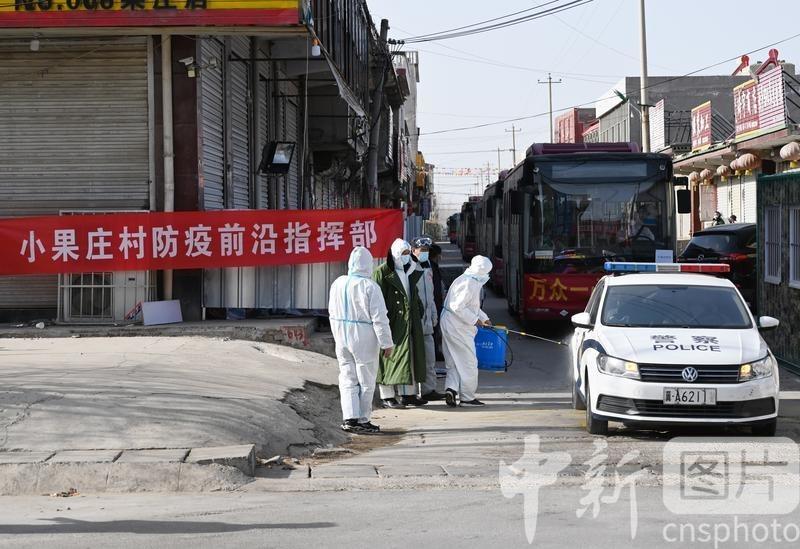 Workers disinfect vehicles at Xiaoguozhuang, a village in Shijiazhuang, Hebei province, on Monday, as villagers take buses to a quarantine center where they will go through centralized isolation. The village is one of the hot spots of the recent COVID-19 outbreak. (ZHAI YUJIA / CHINA NEWS SERVICE)
Workers disinfect vehicles at Xiaoguozhuang, a village in Shijiazhuang, Hebei province, on Monday, as villagers take buses to a quarantine center where they will go through centralized isolation. The village is one of the hot spots of the recent COVID-19 outbreak. (ZHAI YUJIA / CHINA NEWS SERVICE)
In Taitou, a village in Shijiazhuang, Hebei province, middle-aged and sometimes gray-haired volunteers are everywhere.
Dressed in red vests and hats, they do shifts standing guard at the village's entrance in freezing temperatures.
They are responsible for keeping people from entering or leaving the rural community during the city's lockdown, triggered by an ongoing COVID-19 outbreak.
Aged between 40 and 70, the 30 volunteers have been organized by the village's Old People's Association
Aged between 40 and 70, the 30 volunteers have been organized by the village's Old People's Association.
"We arrange for the younger ones to be on the night shift, while the older ones take the day shift," said Liu Dongsheng, the association's chairman. "The post cannot be left vacant."
READ MORE: Expert: Hebei outbreak can be contained in a month
When off duty, the red-hatted farmers shuttle between the homes of senior neighbors-many with some degree of disability-to ensure that food and medicine is available in sufficient quantities for people in home quarantine.
They also work at the forefront of the city's mass coronavirus testing campaigns, doing registration work to ensure that some disabled or childless neighbors are not overlooked.
Taitou, which has about 170 residents, mostly seniors, is among the many villages in the city that have stepped up to control the pandemic.
ALSO READ: Hebei tries to stop spread of new infections
Alert levels rose after a couple of other villages in eastern Shijiazhuang became hot spots for the novel coronavirus earlier this month. Weak points in detection and prevention were identified in rural regions, prompting two mass testing campaigns.
The city launched its second wave of testing for its 11 million residents on Tuesday, after more than 350 people tested positive in an earlier round.
Hebei confirmed its first case this year in a village in the city's Gaocheng district, which has since been designated as a region of higher infection risk. As of Monday, the province had 305 confirmed cases.
The provincial government said on Sunday that more than 85 percent of confirmed infections detected in Hebei this month have been in rural regions. Many of the confirmed cases were people who had attended gatherings, such as weddings, banquets and funerals.
Statistics released by the National Health Commission suggest that rural residents' health literacy-the ability to obtain, read, understand and use healthcare information in order to make appropriate health decisions and follow instructions for treatment-was 15.67 percent in 2019, lagging behind their urban counterparts'24.81 percent.
This gap has become more evident during the more recent outbreaks in Beijing and Heilongjiang province, as all have occurred in rural areas.
In a circular released on Tuesday, the Hebei Provincial Center for Disease Control and Prevention said rural residents have limited access to health information and lower awareness of how to protect themselves.
The center said rural customs such as weddings, funeral gatherings and frequent visits to neighbors' homes have made these areas more vulnerable to outbreaks.
Liu, 69, said that as the epidemic eased, many people had let down their guard.
"We use loudspeakers to spread anti-epidemic knowledge, and we visit people door-to-door to ensure they do not gather for a chat or mahjong sessions," he said.
The Old People's Association was founded two years ago with funding from Hehua Foundation of Hebei province, a local charity focusing on issues related to aging in the countryside.
The foundation hires social work groups to train association members in management skills and first-aid techniques.
Many self-governing groups of residents have tapped the strength of their close-knit organizations and have strong mobilization power to take the anti-epidemic drive to the province's rural communities.
Song He, a Hehua Foundation official who oversees funding for such groups, said that scores of groups that receive its funding have joined local epidemic control task forces under the leadership of local branches of the Communist Party of China.
"They include old people's associations and women's associations in 27 villages across Hebei," he said.
Li Shuanlai is the chairman of an old people's association in the village of Dongzhuang, a 40-minute drive from Taitou. The group started receiving funds from the foundation in 2018.
Li, 65, said that many of the seniors don't realize that the virus is virulent, as there are few visitors to the village. He added that the services offered by volunteers and charitable foundations have helped to unite people in times of emergency.
With funding from the foundation, a cafeteria has been set up, and older people can get three meals a day for 100 yuan (US$15) a month-a boon in a place where most of the young adults are gone, working at jobs far from their elderly parents. But that creates a shortage of caregivers.
"This has united our residents," Li said. "Many are now eager to pay back the favor through voluntary service."


